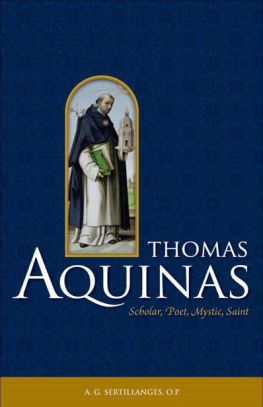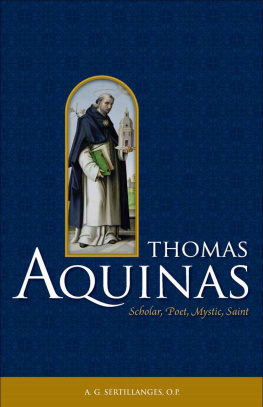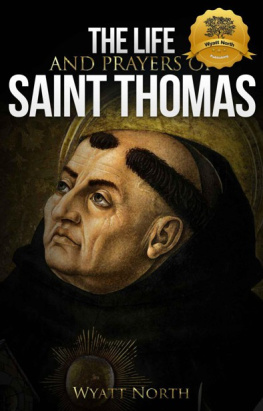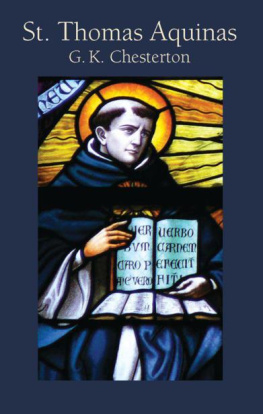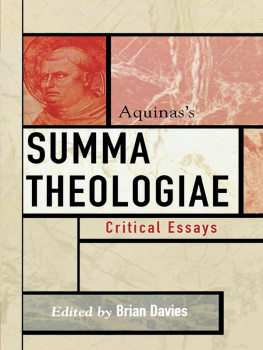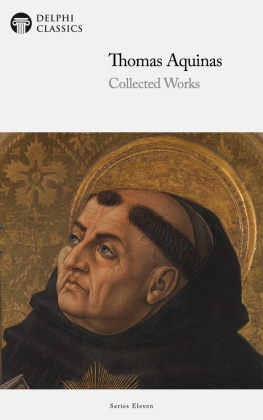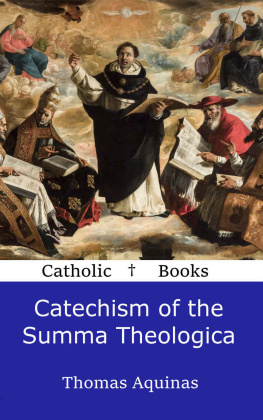Thomas Aquinas
Scholar, Poet, Mystic, Saint
A. G. Sertillanges, O.P.
Translated by Godfrey Anstruther, O.P.
SOPHIA INSTITUTE PRESS
Manchester, New Hampshire
Thomas Aquinas: Scholar, Poet, Mystic, Saint, an English translation of Saint Thomas dAquin of the series Grands Coeurs, was originally published by Burns, Oates, and Washbourne, Ltd., London, in 1957. This 2011 edition by Sophia Institute Press includes minor editorial revisions.
Copyright 2011 Sophia Institute Press
Printed in the United States of America
All rights reserved
Cover design by Carolyn McKinney
On the cover: St. Thomas Aquinas Reading, by Fra Bartolommeo, Museo di San Marco dellAngelico, Florence, Italy / The Bridgeman Art Library.
No part of this book may be reproduced, stored in a retrieval system, or transmitted in any form, or by any means, electronic, mechanical, photocopying, or otherwise, without the prior written permission of the publisher, except by a reviewer, who may quote brief passages in a review.
Sophia Institute Press
Box 5284, Manchester, NH 03108
1-800-888-9344
www.SophiaInstitute.com
Nihil obstat:
Fr. Henry St. John, M.A., O.P.
Fr. Richard Kehoe, S.J.L., O.P.
Imprimatur:
Fr. Bede Jarrett, O.P., Provincial
August 28, 1932
Nihil obstat:
Edward J. Mahoney, S.Th.D.,
Censor Deputatus
Imprimatur: Joseph Butt,
Vicarius Generalis
Westmonasterii, October 20, 1932
Library of Congress Cataloging-in-Publication Data Sertillanges, A. G. (Antonin Gilbert), 1863-1948
[S. Thomas dAquin. English]
Thomas Aquinas : scholar, poet, mystic, saint / A. G. Sertillanges ; translated by Godfrey Anstruther.
p. cm.Originally translated and pub.: London : Burns, Oates & Washbourne, ltd., 1933.
Includes bibliographical references.
ISBN 978-1-933184-70-8 (pbk. : alk. paper) 1. Thomas, Aquinas, Saint, 1225?-1274 I. Title. II. Title: Saint Thomas Aquinas.
BX4700.T6S4213 2011
230.2092 dc22[B]2009039541
First printing
Also from Sophia Institute Press by A. G. Sertillanges:
What Jesus Saw from the Cross
Translators Note
This book appeared in French as one of the series of Grands Coeurs, under the simple title Saint Thomas dAquin. Since it is here published as an isolated work, I have given it a more distinctive title.
As a literal translation would have proved intolerable to English readers, I have at times exercised considerable freedom in translating, without, I hope, any detriment to the authors meaning.
A few minor corrections have been made, with the authors approval.
G. A.
Introduction
All great men have understood their own age and furnished what it sought. This alone marks them out as heroes worthy of our admiration. But if there are among them men who represent our common nature in one of its permanent functions, their work outlives them, and their message makes a fresh appeal to each generation.
St. Thomas is of this number. He had the divine spark. His doctrine contains something whereby it can renew itself from age to age, while his personality, perfect type as he is of scholar, social benefactor, and saint, is a constant example.
It is gratifying to view this double solution of the problem of existence: by abstract thought in his inspired Summa, and by example in his heroic life. This one man satisfies the two great ideals that we seek with almost equal zest: the ideal of intelligence and the ideal of holiness. Moreover, so closely are they united in him that he has created a new harmony. Holiness in him is a search for knowledge, and his knowledge is his message.
Today, when the world is in a state of upheaval, blinded by uncontrolled lights, and befogged by undisciplined instincts, today is the moment to bring forth such an example. To lead men to meditate on a mind attuned to all knowledge, a soul given up to the supreme values, is the aim of this little book.
Rosemont
September 8, 1930
Editors note: The biblical quotations in the following pages are taken from the Douay-Rheims edition of the Old and New Testaments. Where applicable, quotations have been cross-referenced with the differing names and enumeration in the Revised Standard Version, using the following symbol: (RSV = ).
Chapter One

St. Thomass Epoch
The beginning of the thirteenth century has often been described as a time when revolutionary forces, coupled with confusion of mind, were on the verge of misguiding Christian thought and Christian civilization. Pre Mandonnet, O.P., in his classic Siger de Brabant, has drawn a vivid picture of that epoch, but it is enough for our present purpose to point out its salient characteristics, as these are sufficiently striking not to need further amplification.
The West was Christian to the core. Christianity had been present when its civilization was formed, had watched over its infancy, inspired its institutions, and nourished its thought with doctrines derived from the Gospel by centuries of development. It thus possessed the greatest possible treasure, a doctrine of life, in those days which our modern topsy-turvy civilization likes to refer to as the Dark Ages.
Then a crisis arose, comparable to that of the sixteenth century, and due to similar causes. It was a question, then as always, of growth; and the growth of institutions, like the growth of a child, is beset with dangers. If it goes wrong, we call it a decline, and in a society fundamentally sound but still unstable, and only imperfectly adapted to the general laws of human thought and experience, such a decline might well prove fatal.
Like the crisis at the Renaissance, this, too, was a return to antiquity. Greek thought and Greek ideas invaded the Christian West, by the introduction of Arab, Jewish, and Alexandrine philosophy. It was a breath of life, but it came as a cyclone; it was at once a medicine and a poison.
Aristotle became the new God. His writings, inflated by misleading commentaries, were inadequate in themselves, while their excessive naturalism, together with some particularly serious blemishes, threatened to lead Christian thought astray. And they had ardent followers in the schools, who were ready to push them to extremes.
Even the teaching on God was endangered, for Aristotles treatment of God in the twelfth book of the Metaphysics is misleading, despite its highly intellectual character. With great caution it can be explained in a Christian sense, as has indeed been done by St. Thomas, but even then, it is meager and wholly inadequate. God has no definite personality; there is no affirmation of providence, nor even of his freedom in creating. While he is admitted as the final cause, his efficient causality, if not openly denied, is at least made very doubtful.
Similarly, Aristotle makes the soul something above matter; it is separate; it comes to the body from without, as it were by the door. There is no certitude that it belongs to the individual, that it guarantees him a really spiritual and immortal life, that it makes him really responsible. He leaves it an open question whether morality is a mere whim, or corresponds to a divine order. Everything is vague and ambiguous enough to enable commentators, especially the Arabs, to interpret it in a sinister sense.
People began to be known as Aristotelians, followers of Averroes, Avicenna, Avicebron, and Maimonides, and their Christianity was at a low ebb. Under the aegis of the Philosopher and his followers, they disputed the most fundamental and certain of Catholic dogmas. The creation of the world in time, the divine government and Fatherhood, the individuality and immortality of the soul, free will, and moral responsibility gave place to an eternal world, an abstract God cut off from all communication with his creatures, a unique Intellect for all men, which alone was immortal, a strict determinism, physical and psychological, which ruled out all responsible action. That was knowledge. The Christian faith, the basis of civilization and the mother of all learning, could not be openly attacked, but there was always this bias, which was later to call forth St. Thomass most indignant protests.
Next page
